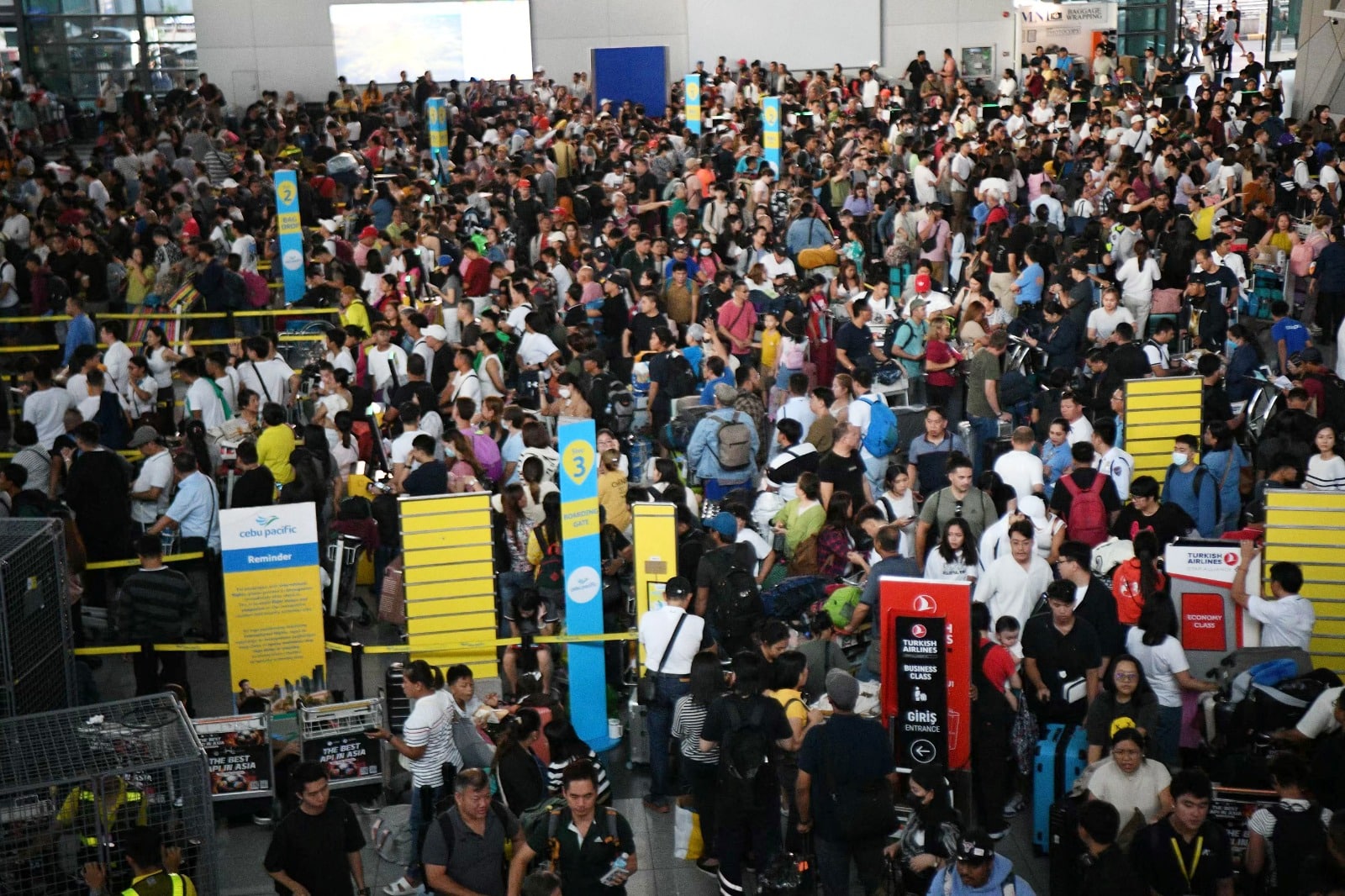PH banks, airlines not spared from global Microsoft outage

RIPPLE EFFECT Passengers crowd departure counters at Terminal 3 of Ninoy Aquino International Airport on Friday, as a major outage wrought havoc on computer systems worldwide, grounding flights in the United States, derailing television broadcasts in the United Kingdom and impacting telecommunications in Australia. —AFP
The Philippines was not spared from disruptions caused by a massive outage on Friday that hit Microsoft users worldwide, affecting banking activities and airline companies in the country.
State-run Land Bank of the Philippines said its digital channels had been restored after being hit by the outage that also caused major business disruptions in the United States, Australia and Singapore, among other countries.
Metrobank advised its clients of a “slowdown or temporary unavailability” of some of its online services, while UnionBank of the Philippines said its customer service hotline, “some” branch services and online credit card transactions were temporarily unavailable.
Ayala-led Bank of the Philippine Islands (BPI) also issued an advisory on the outage, which led to “longer wait times in our branches and contact center.”
Airlines, health services
BPI said its customers may continue to experience delays in the crediting of such transactions as bills payments and interbank money transfers.
Article continues after this advertisementBut “[r]est assured that this issue should not be a cause for concern,” the bank said, adding that its branches and services “remain available.”
Article continues after this advertisementApart from banks, the crash also affected the operations of local airlines, with budget carrier Cebu Pacific saying in an advisory that its staff would “handle affected passengers manually, potentially causing delays.”
AirAsia said the outage caused “unexpected rebooting of machines, leading to some operational disruptions related to check-in processes, self check-in kiosks and navigating the AirAsia MOVE app.”
But flag carrier Philippine Airlines said it did not experience these issues.
The Manila International Airport Authority (Miaa), operator of Ninoy Aquino International Airport (Naia), said it mobilized additional manpower to manage extended queues at check-in counters.
By 4 p.m. Friday, international carriers at Naia were unaffected, Miaa said.
Major airlines in the United States – American Airlines, Delta Airlines and United Airlines – grounded flights, while other carriers and airports around the world reported delays and disruptions.
Health-care services were also hit by system problems. In Britain, booking systems used by doctors were offline, according to multiple reports by medical officials, while Sky News, one of the country’s major news broadcasters, was off air, apologizing for being unable to transmit live.
Soccer club Manchester United said it had to postpone a scheduled release of tickets.
Blue screen
Microsoft’s cloud unit Azure said it was aware of the issue that impacted virtual machines running Windows OS, while the CrowdStrike Falcon agent was getting stuck in a “restarting state.” “We’re aware of an issue affecting Windows devices due to an update from a third-party software platform. We anticipate a resolution is forthcoming,” a Microsoft spokesperson said.
According to an alert sent by CrowdStrike to its clients and reviewed by Reuters, the company’s “Falcon Sensor” software is causing Microsoft Windows to crash and display a blue screen, known informally as the “Blue Screen of Death.”
‘Security software’
The alert, which was sent at 5:30 GMT on Friday, also shared a manual workaround to rectify the issue.
Over half of Fortune 500 companies use CrowdStrike software, the US company said in a promotional video this year.
There was no information to suggest the outage was a cybersecurity incident, Australia’s National Cyber Security Coordinator Michelle McGuinness said in a post on X.
A British government source also told Reuters there was nothing to suggest foul play.
“The world grinding to a halt because of a global IT meltdown shows the dark side to technology,” AJ Bell investment analyst Dan Coatsworth said.
READ: ‘Large-scale’ IT outage hits companies worldwide
“The severity of the problem boils down to how long it lasts. A few hours’ disruption is unhelpful but not a catastrophe. Prolonged disruption is another matter,” he said.
Satnam Narang, senior staff research engineer of cybersecurity firm Tenable, noted that “while the issue is associated with Windows systems, it does not appear to be an issue with Microsoft Windows, but rather, security software installed on millions of Windows computers worldwide.”
“Because this is a security software, it requires a higher level of privileges to the underlying operating system, so a bad or faulty security update can result in a catastrophic impact.”
“This event is unprecedented and the ramifications of it are still developing,” he added. —WITH REPORTS FROM MEG J. ADONIS, TYRONE JASPER C. PIAD AND REUTERS